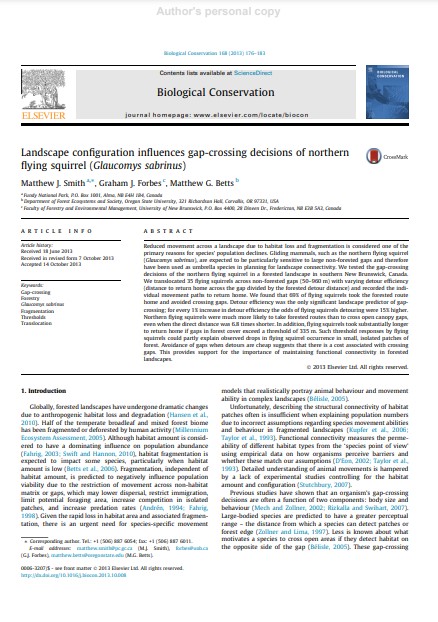Landscape configuration influences gap-crossing decisions of northern flying squirrel (Glaucomys sabrinus)
Bosque Modelo:
Fundy
Temática:
Gestión forestal
Tipo de documento:
Artículo científico
Resumen
Reduced movement across a landscape due to habitat loss and fragmentation is considered one of the primary reasons for species’ population declines. Gliding mammals, such as the northern flying squirrel (Glaucomys sabrinus), are expected to be particularly sensitive to large non-forested gaps and therefore have been used as umbrella species in planning for landscape connectivity. We tested the gap-crossing decisions of the northern flying squirrel in a forested landscape in southern New Brunswick, Canada. We translocated 35 flying squirrels across non-forested gaps (50–960 m) with varying detour efficiency (distance to return home across the gap divided by the forested detour distance) and recorded the individual movement paths to return home. We found that 69% of flying squirrels took the forested route home and avoided crossing gaps. Detour efficiency was the only significant landscape predictor of gapcrossing; for every 1% increase in detour efficiency the odds of flying squirrels detouring were 15% higher. Northern flying squirrels were much more likely to take forested routes than to cross open canopy gaps, even when the direct distance was 6.8 times shorter. In addition, flying squirrels took substantially longer to return home if gaps in forest cover exceed a threshold of 335 m. Such threshold responses by flying squirrels could partly explain observed drops in flying squirrel occurrence in small, isolated patches of forest. Avoidance of gaps when detours are cheap suggests that there is a cost associated with crossing gaps. This provides support for the importance of maintaining functional connectivity in foreste landscapes.
Información Bibliográfica
Autor:
Smith, Matthew J.; Forbes, Graham J.; Betts, Matthew G.
Revista:
BIOLOGICAL CONSERVATION
Año:
2013
N°:
-
País :
Canadá
Páginas:
176 - 183
Volumen:
168
Idioma:
Ingles
Palabras claves
Gap-crossing Forestry Glaucomys sabrinus Fragmentation Thresholds Translocation





